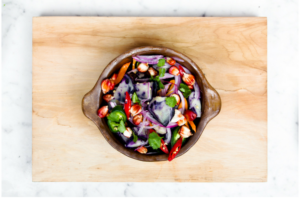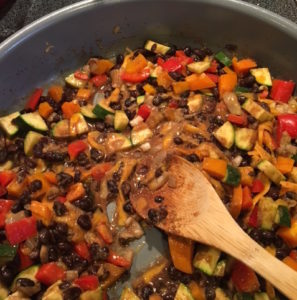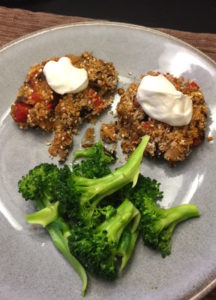We all know that our country has had an obsession with protein for quite some time now. It is a huge marketing tool and companies seem to be adding protein to everything! Protein crackers! Protein peanut butter! Higher protein bars!
In my professional and personal opinion, I think most people do get adequate amounts of protein in their diets (because as stated we are obsessed with it) but society as a whole eats too much low quality protein. I use the term low quality not in the terms of our body not being able to absorb the nutrients but low quality meaning highly processed, pumped with fillers and from questionable sources. Protein needs, just like overall calorie, carbohydrate and fat requirements are based on a few factors. Gender, age, height, weight, activity level and current stage of life (pregnancy, menopause, disease) etc. all influence how many calories and macronutrients we need each day. Obviously, some of these will change and some will not. There are a few different recommendations for protein requirements but it is certain that an athlete or someone highly active requires more protein than someone sedentary. I also tend to eat a bit higher protein diet as I am very active, it makes me feel good, perform well and maintain my weight.
Though vegetarians diets are obviously nothing new and our country is still protein obsessed, I have recently seen the flexitarian diet become increasingly popular. This diet is mostly plant based but also allows meat once in awhile. I like the term plant based carnivore. The meat is more of a side dish than a main. I think this emergence has to do with many reasons from the environmental impact of meat to the questionable sources and food safety of the meat in this country. Regardless of the studies you can find supporting eating meat or not (and trust me, you can find research to support the pros and cons of both) I do not think anyone can argue against eating more vegetables. The recommend servings of vegetables is 4-5 per day for someone eating around 2,000 calories and the average adult (according to 2013 CDC data) eats only 1.6 per day!
I was a vegetarian for 8 years. Let me rephrase that, I was a starchitarian for 8 years. I did not eat mostly plants, I ate mostly bread, processed soy made into fake looking meat products, crackers etc. I thought I was doing it for health reasons which when I look back, I was eating so many processed carbs and frakenfoods that I would have been better off just eating meat once in awhile. I was 12-20 years old so probably not my brightest years. But I still see this today in many adults. They are vegetarian but aren’t eating that many vegetables. They are eating mainly starches and processed carbs. So though I do believe you can eat a vegetarian diet and get all the nutrients you need, I do think you need to be more aware of certain nutrient intakes.
Vegetarian diets can include insufficient amounts of protein, iron, vitamin B12, vitamin D and calcium if not well balanced. I am not talking about or addressing vegan diets in this blog as with the lack of eggs and cheese and dairy, vegan diets, need even more careful planning and attention.
Vegetarians need to pay attention to the quality of their protein. A protein based food is deemed high quality if it contains all the essential amino acids. Most meat based products have all the essential amino acids while most plant proteins do not. An easy way to get all the amino acids as a vegetarian is combing certain foods that compliment each other with all the essential amino acids, such as rice and beans.
Iron is another nutrient that is more commonly found in meats but beans, pumpkin seeds, lentils, spinach are all higher in iron. Consuming iron rich foods with Vitamin C rich foods will help increase the absorption. Vitamin D can be found in fortified milk but getting enough sunshine each day (10-15 minutes) is an ideal way to get adequate amounts of Vitamin D. Vitamin B12 is found in cheese and eggs. Lastly, dark green leafy vegetables are high in calcium. Though not likely to be deficient, Omega-3’s from fish are absorbed better by the body, but chia and flax seeds are a good vegetarian option source.
If you want to lose fat or become leaner as a vegetarian, I do think it is possible but you do need to pay attention to your meals a bit more. Here are a few tips that can help:
- Make vegetables and not starchy carbs the focus of your meal. The croquettes I made the other night called for potatoes, quinoa and black beans. That is a lot of starch in one meal. I removed the potatoes and they were delicious!
- Ideally, you still want some type of protein with every meal or snack. Think about adding cheese and a hardboiled egg to a salad, topping Mexican dishes with cheese, sour cream or plain greek yogurt, using high protein tortillas, higher protein grains such as quinoa, add peanut butter or powdered peanut butter to oatmeal, find a high quality vegetable protein powder and make smoothies with it.
- If you are constantly hungry, then something is off. This could be a lack of protein (or other nutrient) but make sure you are not filling up on starchy carbs. How is your fat intake? Vegetarian diets tend to be naturally lower in fat (because meat contains fat) and if you are actually eating lots of vegetables, they are all naturally low fat. Make sure to include healthy fats in your diet as well. Avocado, nuts, seeds, certain oils are all good sources of fats to help our body function properly but to also help keep us satiated.
- If you are constantly fatigued/tired (not mom tired 🙂 but tired all the time even after a decent night sleep) something is off. If you feel sluggish especially in your workouts, your iron levels or your ferritin (stored iron) could be low. This can be checked by your physician. Now, you do not need to necessarily assume you have low iron because you are tired but if you are a vegetarian woman of child bearing age, it can be more common and easily checked by a blood test.
- Make sure you are eating a wide variety of fruits and vegetables. Though I would recommend this for everyone, as mentioned, vegetarian diets can be insufficient in certain nutrients. Eating various colors and types of produce will help your body get a variety of vitamins and minerals which are all important for various body functions.
My family has committed to going meatless once a week. Here are the last few meatless meals I have made that have been delicious and filling! This has challenged my meal planning skills a bit but it has been fun to get a little more creative in the kitchen.
-Grilled vegetable burritos
-Black bean and quinoa croquettes
-Veggie and cheese frittata
-White bean and vegetable soup
-Cauliflower fried rice
My black bean and quinoa croquettes which got a “super duper yummy” from Caleb. #win
So though I do not plan on going back to a complete vegetarian diet as I do love meat and think it definitely can be part of a healthy diet, I do find myself thinking about and trying to eat a little less meat overall.
Looking for more health tips or new recipes? Want some simple but challenging workouts to do at your house? Join me and lots of others during the month of April in the Healthy Baby Fit Mom #Consistency Challenge! We start this Saturday! Totally free, not selling anything, just a great way to jump start spring with a commitment to yourself! This challenge comes with FREE coaching on fat loss, kids nutrition, workout tips and more! Join here.



